commentary Commentary
Commentary: What’s behind Mahathir’s sacking and Malaysia’s new political drama
Mahathir Mohamad’s sacking shows Malaysia’s regime change is far from complete, says James Chin.
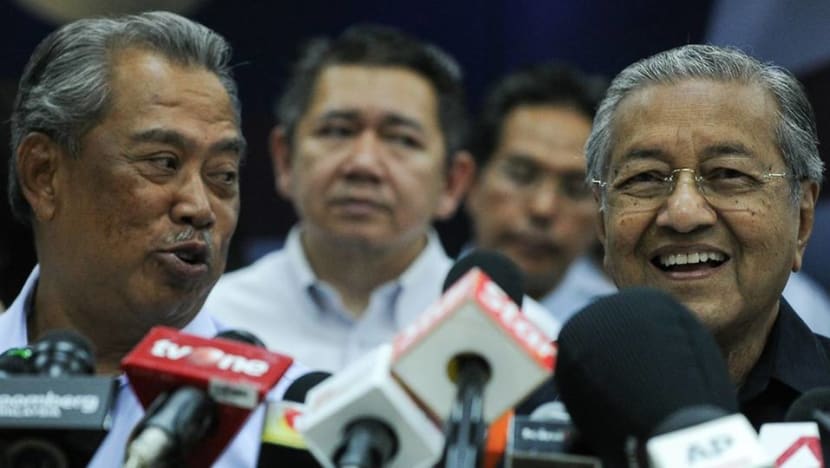
A file photo of Mahathir Mohamad (right) and Muhyiddin Yassin at a press conference in Kuala Lumpur on Mar 4, 2016. (File photo: AFP/Mohd Rasfan)
HOBART: Mahathir Mohammad and four of his key supporters were sacked from Parti Pribumi Bersatu Malaysia (Bersatu) on Thursday (May 28), in what commentators have described as a power move by Prime Minister Muhyiddin Yassin to consolidate power.
To understand this increasingly bitter spat, one must go back to late February when the Pakatan Harapan (PH) government, which Mahathir led, imploded.
Mahathir refused to go along with the majority in Bersatu, led by Muhyiddin Yassin, to form a new government without the Democratic Action Party and Parti Keadilan Rakyat (PKR).
Mahathir then resigned as Bersatu chairman and prime minister. He pitched the idea of an inclusive, “unity” government – but that concept was rejected by all sides.
Within 24 hours of that proposal, Muhyiddin’s faction in Bersatu stitched up a deal with UMNO and PAS, with promise of parliamentary support from GPS, the ruling coalition in Sarawak.
This was enough for the King to use his discretion to appoint Muhyiddin as the new prime minister in March.
READ: Commentary: Why Mahathir leaving may not solve Malaysia’s problems
READ: Commentary: Mahathir Mohamad remains the eye of the political storm brewing in Malaysia
THE BREWING POLITICAL CONTEST
Since then, Mahathir has been trying to pull down Muhyiddin and regain power.
During the special one-day parliamentary sitting on May 18, Mahathir had tried to move a motion calling for his reinstatement as Prime Minister and after failing to do so, attempted to table another vote of no confidence in Muhyiddin.
Inside Bersatu, Mahathir is also vying to expel Muhyiddin. Mukhriz Mahathir, his son and political heir, has filed papers to challenge Muhyiddin for Bersatu’s presidency at the upcoming party congress.
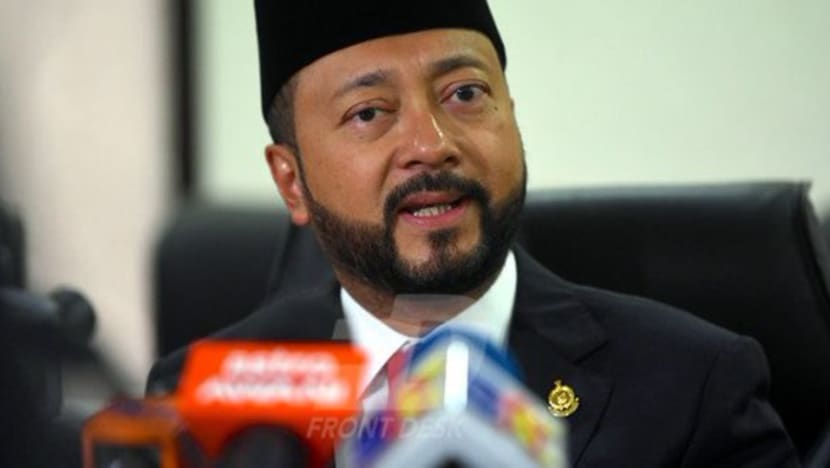
As a consequence of this move, Mukhriz subsequently lost his position as Kedah’s chief minister two weeks ago, after two PKR assemblymen defected.
Mahathir claims he is still Bersatu chairman because his February resignation was not accepted by the party. Moreover, in the upcoming Bersatu party elections, he is the only candidate for the position of chairman of the party.
Unlike other parties, executive power in Bersatu is shared between the party chairman and the party president.
This confusion has created space for political contestation. Mahathir, still supposedly Bersatu’s chairman, is trying to depose the party president.
READ: Party memberships of Mahathir and other MPs were 'ceased' as they acted against Bersatu's constitution: Muhyiddin
READ: Mahathir won’t go quietly after being sacked, even as Muhyiddin consolidates power in Bersatu: Analysts
All that has been solved. By sacking Mahathir as a party member, Muhyiddin becomes acting party chairman while still party president, effectively rendering himself untouchable.
But this drastic action also means any chance of Muhyiddin and Mahathir reconciling politically is close to zero, something supporters of both camps wanted.
MAHATHIR’S OPTIONS
Believe it or not, the sacking is not a knock-out for Mahathir. Mahathir has options.
First, he can appeal to the Registrar of Societies (ROS). Malaysian political parties, unlike most countries, are highly regulated.
All key changes to party leadership requires approval from this government department. If the ROS does not sanction the sacking, then, like a court ruling, the sacking never happened legally.
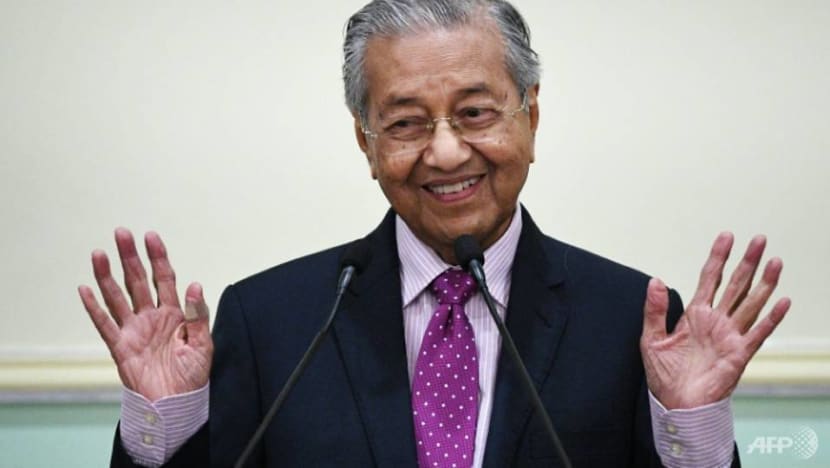
But this option may have been ruled out when the ROS issued a letter in May to Mahathir, indicating acknowledgment that his resignation from the party chairmanship would be effective immediately. Mahathir has rejected this decision and has signalled he intends to challenge it in court.
Second, Mahathir can sue the ROS and ask for a judicial review through the courts if ROS accepts the cessation of Mahathir’s Bersatu membership. If the High Court accepts the case should be opened, the sacking could be held in abeyance until the courts decide. This will take months, effectively prolonging the instability in Bersatu.
This is, however, a high-risk strategy. If the courts were to get involved, the crucial meeting of the Bersatu Supreme Council meeting back in February holds huge significance.
But there are two versions of this meeting. The first version says a decision was made to leave PH and form a new coalition with UMNO and PAS.
READ: Commentary: Wheels set in motion for another political showdown in Malaysia
READ: Commentary: Three underlying forces fuelled Malaysia's recent political crisis
The second version says the Bersatu Supreme Council left the final decision to Mahathir to decide alone. This meeting was recorded clandestinely and portions of it were released over the Internet two weeks ago. One snippet has Muhyiddin proposing that the final decision - to leave or not leave PH - be left to Mahathir.
This is important because Muhyiddin’s supporters have consistently said there was consensus over the decision taken to leave PH and Muhyiddin’s move to set up the Perikatan Nasional was simply to carry out the wishes of the party, in contrast to the narrative from Mahathir supporters that Muhyiddin had taken unilateral action and gone against Mahathir’s expressed wishes.
Third, Mahathir can openly rally ordinary Bersatu members and call for a special meeting of the Bersatu Supreme Council, under Article 16.2 of Bersatu’s party constitution which provides for the chairman to call a Supreme Council meeting.
If he can get a quorum for this meeting, the Supreme Council can move to sack Muhyiddin from the party, and Mahathir’s faction can assume total control of the party again.
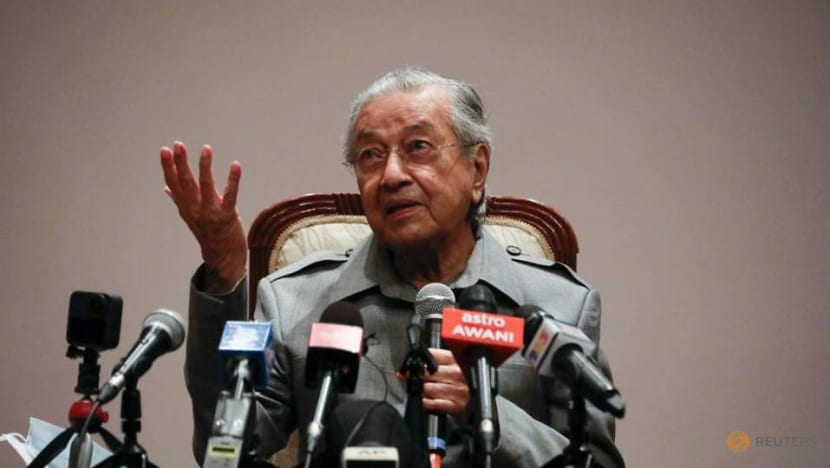
Fourth, and this is unlikely, Mahathir can split the party by forming a new party and inviting Bersatu Members of Parliament and members to defect, thus fatally weakening Bersatu.
But this requires time and Mahathir’s current deadline is July when Parliament will sit again.
There are brewing concerns Mahathir plans to use that session to depose Muhyiddin by tabling and passing a successful vote of no confidence, forcing Muhyiddin to resign. This will be followed by a swift vote of confidence in Mahathir, paving the way for him to be appointed prime minister again.
No matter how you look at it, Mahathir remains a major thorn in Muhyiddin’s side. The nonagenarian will accept nothing less than Muhyiddin stepping aside and allowing him to step back into the driver’s seat.
THE WIDER PICTURE: WHO ELSE BENEFITS FROM THE DRAMA
In one of the biggest ironies of Malaysian politics at this moment, the biggest winner in this conflict is Najib Razak.
Najib has been mocking Mahathir (and PKR) relentlessly on social media since late February. Within minutes of Mahathir’s sacking, he posted on Facebook: “Dengar kata ada orang dipecat?” (Heard someone just got sacked?). This post alone has generated 180,000 likes and more than 13,000 shares.
The amount of political sway he possesses is demonstrated in the fact that his son Nizar Najib is the leading contender UMNO is considering nominating as candidate for the upcoming Chini by-election in July.
This also suggests the 1MDB corruption charges he currently faces has been discounted by the UMNO leadership and they expect he will eventually be acquitted.
I also would not rule out Najib making a political comeback at some point if UMNO remains in power, as remarkable as the premise is.
The other big winner is Anwar Ibrahim. Anwar is still reeling from Azmin Ali’s exit from PKR to support Muhyiddin and is trying to consolidate the party.
The good news is Azmin’s exit has allowed two prominent PKR leaders, Rafizi Ramli and Nurul Izzar, who had been sidelined by Azmin’s faction to play more active roles again in PKR. Rafizi and Nurul are popular with younger Malaysians and they are expected to boost PKR’s popularity.
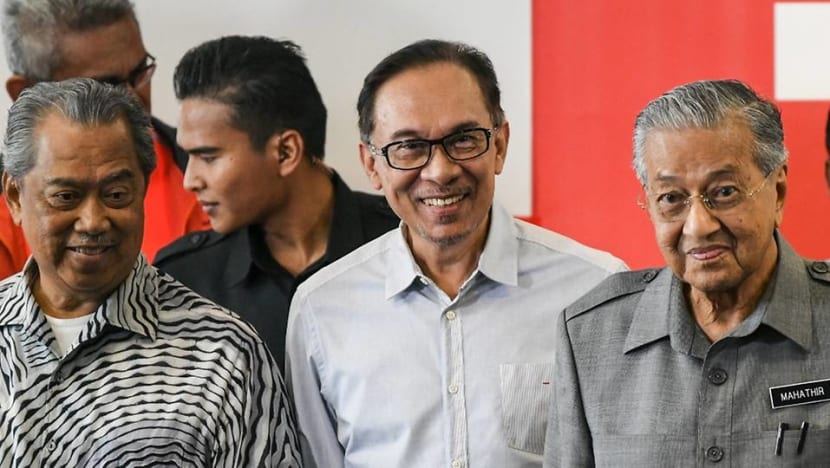
HOW MALAYSIANS ARE REACTING
At the end of the day, the question that needs to be asked is this: Do ordinary Malaysians care about all this drama? I would suggest not.
Malaysia is just starting to emerge from the COVID-19 restrictions and people are worried about adjusting back to work.
The lockdown has also impacted the most important religious holiday, Hari Raya Aidilfitri, which was celebrated last week.
READ: Commentary: Malaysia succeeded in suppressing COVID-19 but here comes the harder part
READ: Commentary: Malaysia's economy has surprised many despite COVID-19. But for how long more?
This year’s celebrations were subdued because Malaysian Muslims living in urban areas could not “balik kampung” (return home). In fact the Movement Control Order (MCO) was extended precisely to prevent mass movement from the cities to the smaller towns and kampungs.
The new drama caused by the sacking reminds all that regime change in the last week of February is still an ongoing process.
It is not a done deal until Mahathir is satisfied - or the fat lady sings.
Professor James Chin is Professor of Asian Studies at the University of Tasmania and Senior Fellow at the Jeffrey Cheah Institute on Southeast Asia.














